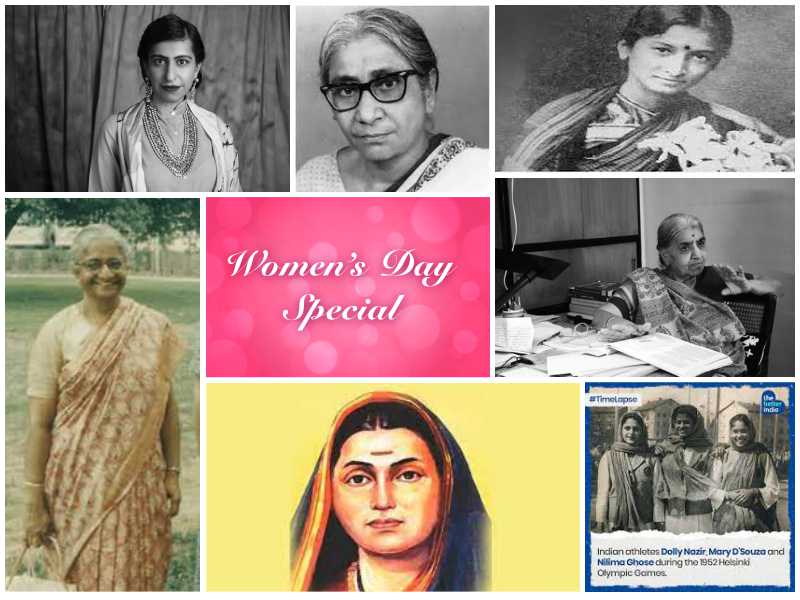Nishant Saxena, Mita Mukherjee, and Reshma Ravishanker
The first month of the year 2023 called for celebrations when yet another woman reiterated that the sky was her limit. Avani Chanturvedi, an Indian Air Force (IAF) female fighter pilot, Squadron Leader became the first to participate in aerial war games.
To set a precedent for Avani’s achievement are women from across India, many of whom fought for gender equality, the right to education, and an acceptable standard of living for women in the country that had just been declared independent. Efforts began as early as the 19th century where women tread a path less taken, leaving a trail for their kind to follow. Here are some such.
Science
Dr. Asima Chatterjee (1917-2006)
The first woman scientist to be awarded a Doctor of Science by an Indian university in 1944 by the University of Calcutta. She was also the first woman to be elected as the general president of the Indian Science Congress. She made significant contributions to medicinal chemistry. She was the first scientist to synthesize progesterone.
Education
Begum Zafar Ali (1901-1999)
Kashmir’s first female matriculate who went by the maiden name Sahibzaadi Syeda Fatima is one of India’s pioneer women’s rights activists and educationists. She began her career in 1925 at the Girls Mission High School as a teacher after crossing several hurdles. She was a proponent of good etiquette and hygiene among girl students. After several stints as principal of schools across Kashmir, she went on to establish a training centre for women as well.
Savitribai Phule (1831-1897)
Born in 1831 in Naigaon, India, Phule is regarded as the country’s first female teacher, poet, and educationist. She created history by opening the first school for women in India and was a strong advocate for women’s empowerment through education. Phule’s legacy lives on in her writings, including “Go, Get Education,” a poem emphasizing the importance of women’s education. Her works include Kavya Phule and Bavan Kashi Subodh Ratnakar, published in 1854 and 1892, respectively. January 3, her birth anniversary is celebrated as Savitribai Phule Jayanti and serves as a reminder of the ongoing struggle for women’s education and empowerment.
Sports
Nilima Ghose & Mary D’Souza
Nilima Ghose (born 1935) is India’s first sportswoman to participate in the Olympics. She was all of 17 when she participated in the 100 meters sprint and 80 meters hurdles in the 1952 Summer Olympics in Helsinki. She was accompanied by Mary D’Souza Sequira (1931), another woman who took part in the 100 meters and 200 meters sprints later. In 2013, Mary has bestowed the Dhyan Chand award, the country’s highest award for achievement in sports.
Cinema
Durgabai Kamat (1879-1997)
The first woman to set her foot in the world of cinemas in India, Durgabai Kamat was born to a Marathi family. She is also the great-grandmother of noted actors Vikram and Mohan Gokhale She was introduced to the cinema audience by Dadasaheb Palke in 1913 with the movie Mohini Bhasmasur. This was at a time when it was considered taboo for women to set foot in the industry.
Engineering
Ayyalasomayajula Lalitha (1919-1979)
The fifth among seven siblings in her middle-class family, Lalitha was widowed at 16. Ever since childhood, an existing gender disparity between male and female children in society irked her. Lalitha was married off at 15 soon after she had completed her matriculation. However, her situation turned worse after her in-laws blamed her for her husband’s death as an ill fate. Instead of bogging down to the pressure, Lalitha chose to chase her professional goal and became the first woman engineer the country had.
Academics
Neera Desai (1925 —2009)
A sociologist, historian, and women’s studies pioneer, she established the first centre dedicated to women’s studies in India. Her legacy lives on as one of the most revered Indian social scientists of the twentieth century. Her most notable book, Woman in Modern India, is recognized as one of the first historical anthologies to examine the status of Indian women. Desai’s thorough critique of society and women’s role in it highlights the need for social change to improve the plight of women. As an “activist scholar,” Desai used her scholarly work to catalyze meaningful change in society.
Politics
Rajkumari Bibiji Amrit Kaur (1887 –1964)
India’s first health minister, Kaur was handed over this important portfolio in 1947. She is widely remembered for her contributions to the healthcare sector and her advocacy of women’s rights. She is remembered for her relentless work towards eliminating illiteracy and customs such as child marriages and the purdah system. In recognition of her work, she was awarded the Rene Sand Memorial Award and named TIME Magazine’s Woman of the Year in 1947.
